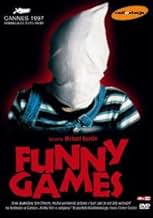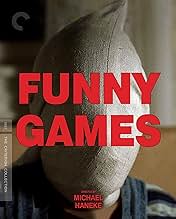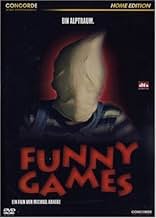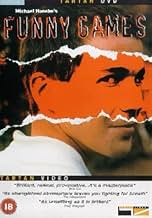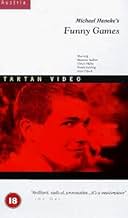Two violent young men take a mother, father, and son hostage in their vacation cabin and force them to play sadistic "games" with one another for their own amusement.Two violent young men take a mother, father, and son hostage in their vacation cabin and force them to play sadistic "games" with one another for their own amusement.Two violent young men take a mother, father, and son hostage in their vacation cabin and force them to play sadistic "games" with one another for their own amusement.
- Awards
- 5 wins & 9 nominations total
- Director
- Writer
- All cast & crew
- Production, box office & more at IMDbPro
Featured reviews
I saw this movie again last night, for the third time, and once again had to keep watching each torturous minute until its chilling end. Going through the comments index, I see the expected responses: it was boring: it was pointless: it was too long: it's a satire: the games aren't actually that funny: it involved the audience in a neato way: it's nothing new: it's been done before. So I here offer an interpretation to add to the cacophany of reactions that FUNNY GAMES seem to engender.
What this movie reminds me of is the Book of Job, in the Bible, where God and Satan decide for their own amusement to torture this guy Job, killing his family, racking him with boils, and various other divine amusements. While watching this movie last night, I thought of another reference, this time from "King Lear": "Like flies to wanton schoolboys are we to the gods;/ They kill us for their sport." What this movie does is challenge the audience's own involvement in visual narrative -- usually, we watch movies from somewhere on-high and omniscient; we're invisible but we see all; we're voyeurs, just like God. In Haneke's film, we identify not with the victims but with the all-powerful killers as they set about their funny games. The two polite young men are performing their entertainments for us, the viewers; they're slaking our bloodthirst, our desire for gory spectacle - - after all, isn't this why we watch movies like this in the first place? Haneke, however, doesn't play the usual evasions; he makes explicit the audience's participation in violence; and he forces upon us the need to take responsibility for it.
I find this fascinating. I also find the negative comments here fascinating as well -- "not violent enough!" "the victims deserve to die..." "all the violence is off-screen..." "no gore at all, 'LAST HOUSE ON THE LEFT' did it first, with more blood...." etc. as being inadvertantly revealing of those viewers' psyche. I especially love the comment made by that one Viking guy, who writes that Haneke's film has "no point," and goes on to say "...I just hope those people break into MY house, so I can break them in two!"
I think Haneke made his point.
What this movie reminds me of is the Book of Job, in the Bible, where God and Satan decide for their own amusement to torture this guy Job, killing his family, racking him with boils, and various other divine amusements. While watching this movie last night, I thought of another reference, this time from "King Lear": "Like flies to wanton schoolboys are we to the gods;/ They kill us for their sport." What this movie does is challenge the audience's own involvement in visual narrative -- usually, we watch movies from somewhere on-high and omniscient; we're invisible but we see all; we're voyeurs, just like God. In Haneke's film, we identify not with the victims but with the all-powerful killers as they set about their funny games. The two polite young men are performing their entertainments for us, the viewers; they're slaking our bloodthirst, our desire for gory spectacle - - after all, isn't this why we watch movies like this in the first place? Haneke, however, doesn't play the usual evasions; he makes explicit the audience's participation in violence; and he forces upon us the need to take responsibility for it.
I find this fascinating. I also find the negative comments here fascinating as well -- "not violent enough!" "the victims deserve to die..." "all the violence is off-screen..." "no gore at all, 'LAST HOUSE ON THE LEFT' did it first, with more blood...." etc. as being inadvertantly revealing of those viewers' psyche. I especially love the comment made by that one Viking guy, who writes that Haneke's film has "no point," and goes on to say "...I just hope those people break into MY house, so I can break them in two!"
I think Haneke made his point.
A pair of polite, bland-ish German teenagers encounter a woman, her husband and son in a remote lakeside cottage, then spend the night terrorizing them with "funny games." The set-up is identical to that of Elia Kazan's THE VISITORS, both versions of DESPERATE HOURS, and many other claustrophobic thrillers; but the feeling of the picture is that of a hundred-minute-long extended dance remix of the ear-slicing in RESERVOIR DOGS. The writer-director Michael Haneke has one ace up his sleeve: the handsomer of the two sociopaths is given asides to the camera, on the order of, "You are on their side, aren't you?"
The point of all this, apparently, is that the audience is implicated in the action, because we, as pop-culture consumers, consume torture and protracted murder as entertainment. But there's a flaw in Haneke's logic: the only time we consume torture and protracted murder as entertainment is in recondite European art films like I STAND ALONE, MAN BITES DOG, and FUNNY GAMES.
This is the kind of picture that gets bluenose types all huffy, and prone to pronouncements on the order of, "This is the most repellent movie ever made!" I'll stay off that high horse--but I will say, a few hours after seeing the picture, that there is something singularly loathsome in the hypocrisy of Haneke's coating a suspenseless piece of fictional snuff porn in the sanctimony of its being a Statement on Violence and Media. Haneke makes the victims as dull and uncharacterized as the victors; removes just about any plausible means of escape or table-turning; and subtracts any reason for us to care about the outcome, except our desire not to witness hideous suffering. What's left--an orgy of S&M-like abuse--certainly does make the audience squirm. But so what? So would a videotape of anonymous torture, or the capture and abuse of an animal. FUNNY GAMES doesn't exist on a political or philosophical level (like I STAND ALONE); its attempts at mordant humor are collegiate (unlike MAN BITES DOG); it certainly doesn't hold up a mirror to a junk-food culture (like NATURAL BORN KILLERS). It's a wallow. And you know what side the filmmakers are on when one of the sadists terrifies a little kid by slipping on a CD in a neighbor's house the kid has escaped to, and the music is that well-known favorite of middle-aged bourgeois people on vacation...John Zorn and the Naked City.
This kind of Extreme Cinema has worked much better when practiced by artists in totally disreputable sub-pulp forms--like Lucio Fulci and Ruggero Deodato, whose sometimes almost unwatchable films engage in a spiritual wrestling match between the desire to go to the limits, and the conscience that watches over the mayhem. I was shocked to discover that Haneke is nearly sixty--this picture has the sensibility of a kid turned on by the autopsy pictures at Amok Books. As he sticks bamboo under our fingernails, your mind is so unoccupied it asks other questions. Like: Why would any sane family entertain for a minute two young strangers wearing fingerprint-proof gloves in the middle of summer? And: Is the actress playing the mother this terrible because no one else would take such a degrading role?
The point of all this, apparently, is that the audience is implicated in the action, because we, as pop-culture consumers, consume torture and protracted murder as entertainment. But there's a flaw in Haneke's logic: the only time we consume torture and protracted murder as entertainment is in recondite European art films like I STAND ALONE, MAN BITES DOG, and FUNNY GAMES.
This is the kind of picture that gets bluenose types all huffy, and prone to pronouncements on the order of, "This is the most repellent movie ever made!" I'll stay off that high horse--but I will say, a few hours after seeing the picture, that there is something singularly loathsome in the hypocrisy of Haneke's coating a suspenseless piece of fictional snuff porn in the sanctimony of its being a Statement on Violence and Media. Haneke makes the victims as dull and uncharacterized as the victors; removes just about any plausible means of escape or table-turning; and subtracts any reason for us to care about the outcome, except our desire not to witness hideous suffering. What's left--an orgy of S&M-like abuse--certainly does make the audience squirm. But so what? So would a videotape of anonymous torture, or the capture and abuse of an animal. FUNNY GAMES doesn't exist on a political or philosophical level (like I STAND ALONE); its attempts at mordant humor are collegiate (unlike MAN BITES DOG); it certainly doesn't hold up a mirror to a junk-food culture (like NATURAL BORN KILLERS). It's a wallow. And you know what side the filmmakers are on when one of the sadists terrifies a little kid by slipping on a CD in a neighbor's house the kid has escaped to, and the music is that well-known favorite of middle-aged bourgeois people on vacation...John Zorn and the Naked City.
This kind of Extreme Cinema has worked much better when practiced by artists in totally disreputable sub-pulp forms--like Lucio Fulci and Ruggero Deodato, whose sometimes almost unwatchable films engage in a spiritual wrestling match between the desire to go to the limits, and the conscience that watches over the mayhem. I was shocked to discover that Haneke is nearly sixty--this picture has the sensibility of a kid turned on by the autopsy pictures at Amok Books. As he sticks bamboo under our fingernails, your mind is so unoccupied it asks other questions. Like: Why would any sane family entertain for a minute two young strangers wearing fingerprint-proof gloves in the middle of summer? And: Is the actress playing the mother this terrible because no one else would take such a degrading role?
I watched this year's remake of "Funny Games" prior to the original, simply because its sick-with-irony trailer got me extremely curious. Granted, this goes against my usual process of viewing a remake's precursor prior to the remake itself, but I couldn't help myself. By the end, I was astonished by writer-director Michael Haneke's audacity in telling a macabre home-invasion story devoid of Hollywood glamour, humor, and mercyremake or no, it's still one of the ballsiest exercises in visceral, reality-based horror ever released by a major studio.
So, when I decided to give the original "Funny Games" a spin (mere days after my viewing of American version), I was filled with presupposition toward how much I would appreciate the original (with the twists of Haneke's shot-for-shot remake still mapped out in my mind)similar to a sadistic "bet" our captors make with their prey, I was wondering if this earlier, German-language version would survive on its own terms. And, while each version is practically identical (save for some subtle nuances in the performances, the slightly varied location design, andof coursethe spoken language), both quite miraculously carry the same visceral, jaw-dropping sucker-punches as the other. Unlike the much-derided American remakes of "The Vanishing" and "Les Diaboliques," Haneke sees no need to let either culture off the hook, especially when each has its own prominent history of violence, on- and off-camera.
Ironically, the references to metalhead couch potatoes Beavis and Butt-Head probably seemed like an incendiary bitch-slap to the passive glamorization of American filmed violence in the 1997 version, but there is an even stronger sense of irony when the MTV-hosted duo are referenced in the remakeon the shores that birthed them, and the cult following of Generation Y-ers that has accumulated in the years since the show's cancellation (a sure sign that our passivity, if anything, is more pronounced now). It's subtle observations like this that give both versions of "Funny Games" an added resonance.
If anything takes some getting used to in the 1997 film, it's the general unfamiliarity of the cast. After seeing a collection of familiar performers run through Haneke's horrifying 2008 experiment, the German cast begins with a studied approach to the performances that eventually loosens into hysteria and desperation that is just as convincing as their remake counterparts. It is truly stunning how Haneke mines the same static framing and intense performances to ends that are equally effective in both films (even knowing the outcome of a protracted long take following a pivotal off-screen event, I found the experience just as emotionally agonizing to witness).
While it may seem hypocritical to "side" with Haneke (at least in the context his film creates), especially when I patronize (and am prone to enjoying) films that frequently downplay the reality of human suffering, the effect in both versions of "Funny Games" is undeniably powerfulthese are difficult, ugly, and emotionally draining films crafted with undeniable (and remarkably subtle) purpose. If there's any catharsis to be had from them, it will be in the introspection and assessment of your own attitudes toward violence.
So, when I decided to give the original "Funny Games" a spin (mere days after my viewing of American version), I was filled with presupposition toward how much I would appreciate the original (with the twists of Haneke's shot-for-shot remake still mapped out in my mind)similar to a sadistic "bet" our captors make with their prey, I was wondering if this earlier, German-language version would survive on its own terms. And, while each version is practically identical (save for some subtle nuances in the performances, the slightly varied location design, andof coursethe spoken language), both quite miraculously carry the same visceral, jaw-dropping sucker-punches as the other. Unlike the much-derided American remakes of "The Vanishing" and "Les Diaboliques," Haneke sees no need to let either culture off the hook, especially when each has its own prominent history of violence, on- and off-camera.
Ironically, the references to metalhead couch potatoes Beavis and Butt-Head probably seemed like an incendiary bitch-slap to the passive glamorization of American filmed violence in the 1997 version, but there is an even stronger sense of irony when the MTV-hosted duo are referenced in the remakeon the shores that birthed them, and the cult following of Generation Y-ers that has accumulated in the years since the show's cancellation (a sure sign that our passivity, if anything, is more pronounced now). It's subtle observations like this that give both versions of "Funny Games" an added resonance.
If anything takes some getting used to in the 1997 film, it's the general unfamiliarity of the cast. After seeing a collection of familiar performers run through Haneke's horrifying 2008 experiment, the German cast begins with a studied approach to the performances that eventually loosens into hysteria and desperation that is just as convincing as their remake counterparts. It is truly stunning how Haneke mines the same static framing and intense performances to ends that are equally effective in both films (even knowing the outcome of a protracted long take following a pivotal off-screen event, I found the experience just as emotionally agonizing to witness).
While it may seem hypocritical to "side" with Haneke (at least in the context his film creates), especially when I patronize (and am prone to enjoying) films that frequently downplay the reality of human suffering, the effect in both versions of "Funny Games" is undeniably powerfulthese are difficult, ugly, and emotionally draining films crafted with undeniable (and remarkably subtle) purpose. If there's any catharsis to be had from them, it will be in the introspection and assessment of your own attitudes toward violence.
I think this movie attempts something virtually impossible, and probably only a German filmmaker would be interested in this particular problem. Watching film is intrinsically exploitive. Often the cinematic exaggeration of entering personal space results in violence. What about this?
An intelligent exploration of this problem from the viewer's side is "Clockwork Orange." Therapy in that case is forced viewing of a movie, presumably the exploration from the filmmaker's side. This is that movie.
Because it is about itself, it enters into a conspiracy of awareness about itself with the viewer. The intruders wink at the audience. Just before the movie begins the phase where it starts to shape up as a movie, that intruder remarks on it not yet being a movie. At one point, the action is "rewound" to be replayed with a different outcome.
It is all very clear. But the challenge is not to remark on the problem, but to say something interesting or new or useful about it. That may be impossible, at least with normal narrative techniques, so this exercise is something of a waste.
The one interesting thing for me is the white gloves. Most commenters assume this is to avoid fingerprints, which goes against every motive we see. As it is the only noticeable costuming, one must conclude it is to denote the cartoonish element.
Ted's Evaluation -- 2 of 3: Has some interesting elements.
An intelligent exploration of this problem from the viewer's side is "Clockwork Orange." Therapy in that case is forced viewing of a movie, presumably the exploration from the filmmaker's side. This is that movie.
Because it is about itself, it enters into a conspiracy of awareness about itself with the viewer. The intruders wink at the audience. Just before the movie begins the phase where it starts to shape up as a movie, that intruder remarks on it not yet being a movie. At one point, the action is "rewound" to be replayed with a different outcome.
It is all very clear. But the challenge is not to remark on the problem, but to say something interesting or new or useful about it. That may be impossible, at least with normal narrative techniques, so this exercise is something of a waste.
The one interesting thing for me is the white gloves. Most commenters assume this is to avoid fingerprints, which goes against every motive we see. As it is the only noticeable costuming, one must conclude it is to denote the cartoonish element.
Ted's Evaluation -- 2 of 3: Has some interesting elements.
I've been watching a lot of films directed by Michael Haneke recently. Why? I don't quite know, probably a combination of things really, availability (UK channel film-four dedicated a Eurovision's season to his work), boredom, and mainly curiosity. When a director has the power to divide an audience as smoothly as the red sea, I take note. When a film comes along that seems to challenge its audience to switch off, look away, find something more rewarding than the monotony of cinema, I can't help but be intrigued. However, reputation and moral outrage does not, a good film make -- and the over-hyped shock of reactionary audiences could not be more present than in the backlash/acclaim dished-out to Haneke's psychological thriller/cum social conscience -- 'Funny Games'.
The title, 'Funny Games', is a curious one, because there's nothing in particularly funny about these Games -- this is without a doubt one of the most unrelenting and unnerving films ever made. It's not horror, but it's tightly wound scenes of tension have a shocking affinity with 'The Texas Chain Saw Massacre' and 'The New York Ripper'. And despite the certainty that this is definitely not a comedy, the majority of the actors still make sly, ironic references, and mug uncontrollably to the camera, the sort of behaviour more at home in a Mel Brooks' spoof than a 'serious' film. However, the multitudes off-putting contradictions only derail Haneke's subtle cinematic depth (he can be a good director when the mood suits him). Hitting us with a message that is so crystal clear, you could write it on a blackboard and even the most shortsighted student at the back could make it out.
The film begins with a family car travelling through a lush Austrian countryside, filled with willowing green trees and homely lakeside cottages. The family, comprising of mother Anna (Susanne Lothar), father Georg (Ulrich Mühe) and young son Junior (Stefan Clapczynski), are on their way to spend a relaxing week of boating, fishing and entertaining with friends, a truly stereotypical portrait of the bourgeoisie. I wouldn't want to ruin the set-up, but from the minute the family arrives at their glorious lakeside home, a mere ten-minutes into the film, you can tell things are about to turn nasty. In setting-up the arrival of the two, white-clad young menaces, Haneke lays down the heavy-hand. Signposting events to the audience with glee, he makes the two youths come across like the killer equivalent of Laurel and Hardy, rather than a male counterpoint to Bonnie and Clyde. Understandably, from this point on, 'Funny Games' spirals way off track.
What follows is one of the most heart stopping, nihilistic and degrading portraits of humanity ever produced. An hour-long onslaught of violence -- sexual, physical, and mental, often at the same time -- and although Haneke goes to great lengths to make sure none of the violence is ever depicted on screen, we are frequently treated to one bloody aftermath after another, complete with copious amounts of screaming from the victims and 'comic' head-scratching from the victors. But unlike a lot of commentators of the film, my negative reaction isn't based on moral outrage, but on the principal fact that 'Funny Games' just isn't a good film. It attempts to convey a serious message, but does so with all the shallow, stylistic emptiness of a Hollywood blockbuster.
To those who trash the film on grounds of violence and pretension, I think you're watching the wrong kind of movie. 'Funny Games' is (supposed to be) about violence, if you know of its reputation then you'll know Haneke is hardly a close cousin to Steven Spielberg, so why is there such surprise when the events turn nasty. In terms of cinematic pressure building 'Funny Games' doesn't do to badly, there is at least a spark of ingenuity to some of the set ups. However Haneke does nothing with these sequences -- his entire objective with the film is to play off the audience's lust for violence and anticipation for characters to be picked off. His message is clear from the start, and after an hour it becomes grating.
Simply put, 'Funny games' doesn't want to do anything other than shock the audience. There is no insight, no creativity and no direction -- in short, it's a film with great promise, but little discipline. If you've seen the pathetic 'Man Bites Dog' or Oliver Stone's over-indulgent 'Natural Born Killers', then you've seen this kind of thing done a million times before and you'll understand why films like this never successfully work . This is the cinematic equivalent of a car wreck, it's messy, violent and never something you'd want to be involved in, but to the spectator it holds an almost forbidden, voyeuristic curiosity. So if you decide to brave the nihilistic mayhem of 'Funny Games', and for whatever reason, find yourself feeling outraged and appalled by the excessive diversions the film takes, don't say you haven't been warned. 1/5
The title, 'Funny Games', is a curious one, because there's nothing in particularly funny about these Games -- this is without a doubt one of the most unrelenting and unnerving films ever made. It's not horror, but it's tightly wound scenes of tension have a shocking affinity with 'The Texas Chain Saw Massacre' and 'The New York Ripper'. And despite the certainty that this is definitely not a comedy, the majority of the actors still make sly, ironic references, and mug uncontrollably to the camera, the sort of behaviour more at home in a Mel Brooks' spoof than a 'serious' film. However, the multitudes off-putting contradictions only derail Haneke's subtle cinematic depth (he can be a good director when the mood suits him). Hitting us with a message that is so crystal clear, you could write it on a blackboard and even the most shortsighted student at the back could make it out.
The film begins with a family car travelling through a lush Austrian countryside, filled with willowing green trees and homely lakeside cottages. The family, comprising of mother Anna (Susanne Lothar), father Georg (Ulrich Mühe) and young son Junior (Stefan Clapczynski), are on their way to spend a relaxing week of boating, fishing and entertaining with friends, a truly stereotypical portrait of the bourgeoisie. I wouldn't want to ruin the set-up, but from the minute the family arrives at their glorious lakeside home, a mere ten-minutes into the film, you can tell things are about to turn nasty. In setting-up the arrival of the two, white-clad young menaces, Haneke lays down the heavy-hand. Signposting events to the audience with glee, he makes the two youths come across like the killer equivalent of Laurel and Hardy, rather than a male counterpoint to Bonnie and Clyde. Understandably, from this point on, 'Funny Games' spirals way off track.
What follows is one of the most heart stopping, nihilistic and degrading portraits of humanity ever produced. An hour-long onslaught of violence -- sexual, physical, and mental, often at the same time -- and although Haneke goes to great lengths to make sure none of the violence is ever depicted on screen, we are frequently treated to one bloody aftermath after another, complete with copious amounts of screaming from the victims and 'comic' head-scratching from the victors. But unlike a lot of commentators of the film, my negative reaction isn't based on moral outrage, but on the principal fact that 'Funny Games' just isn't a good film. It attempts to convey a serious message, but does so with all the shallow, stylistic emptiness of a Hollywood blockbuster.
To those who trash the film on grounds of violence and pretension, I think you're watching the wrong kind of movie. 'Funny Games' is (supposed to be) about violence, if you know of its reputation then you'll know Haneke is hardly a close cousin to Steven Spielberg, so why is there such surprise when the events turn nasty. In terms of cinematic pressure building 'Funny Games' doesn't do to badly, there is at least a spark of ingenuity to some of the set ups. However Haneke does nothing with these sequences -- his entire objective with the film is to play off the audience's lust for violence and anticipation for characters to be picked off. His message is clear from the start, and after an hour it becomes grating.
Simply put, 'Funny games' doesn't want to do anything other than shock the audience. There is no insight, no creativity and no direction -- in short, it's a film with great promise, but little discipline. If you've seen the pathetic 'Man Bites Dog' or Oliver Stone's over-indulgent 'Natural Born Killers', then you've seen this kind of thing done a million times before and you'll understand why films like this never successfully work . This is the cinematic equivalent of a car wreck, it's messy, violent and never something you'd want to be involved in, but to the spectator it holds an almost forbidden, voyeuristic curiosity. So if you decide to brave the nihilistic mayhem of 'Funny Games', and for whatever reason, find yourself feeling outraged and appalled by the excessive diversions the film takes, don't say you haven't been warned. 1/5
Did you know
- TriviaUlrich Mühe and Susanne Lothar, who play the father and mother, were a couple in real life from this movie until Mühe's death in 2007.
- GoofsWhen Anna and Georg are driving in their car, the reflection of a microphone between the front seats can be seen on the window.
- Crazy creditsThe front credits list "music by" several classical composers and John Zorn. Given the director's outspoken views on modern media, including the "composer" of the hardcore "thrash metal" songs alongside the likes of Handel and Mozart is part of his message.
- ConnectionsFeatured in The Last Days of the Board (1999)
- SoundtracksCara Salva
from 'Atalanta'
Music by George Frideric Handel (as G.F. Händel)
Sung by Beniamino Gigli
Published by EMI DA 1918
Details
- Release date
- Country of origin
- Official site
- Languages
- Also known as
- Juegos divertidos
- Filming locations
- Production companies
- See more company credits at IMDbPro
Box office
- Gross worldwide
- $2,014
- Runtime
- 1h 48m(108 min)
- Color
- Sound mix
- Aspect ratio
- 1.85 : 1
Contribute to this page
Suggest an edit or add missing content

